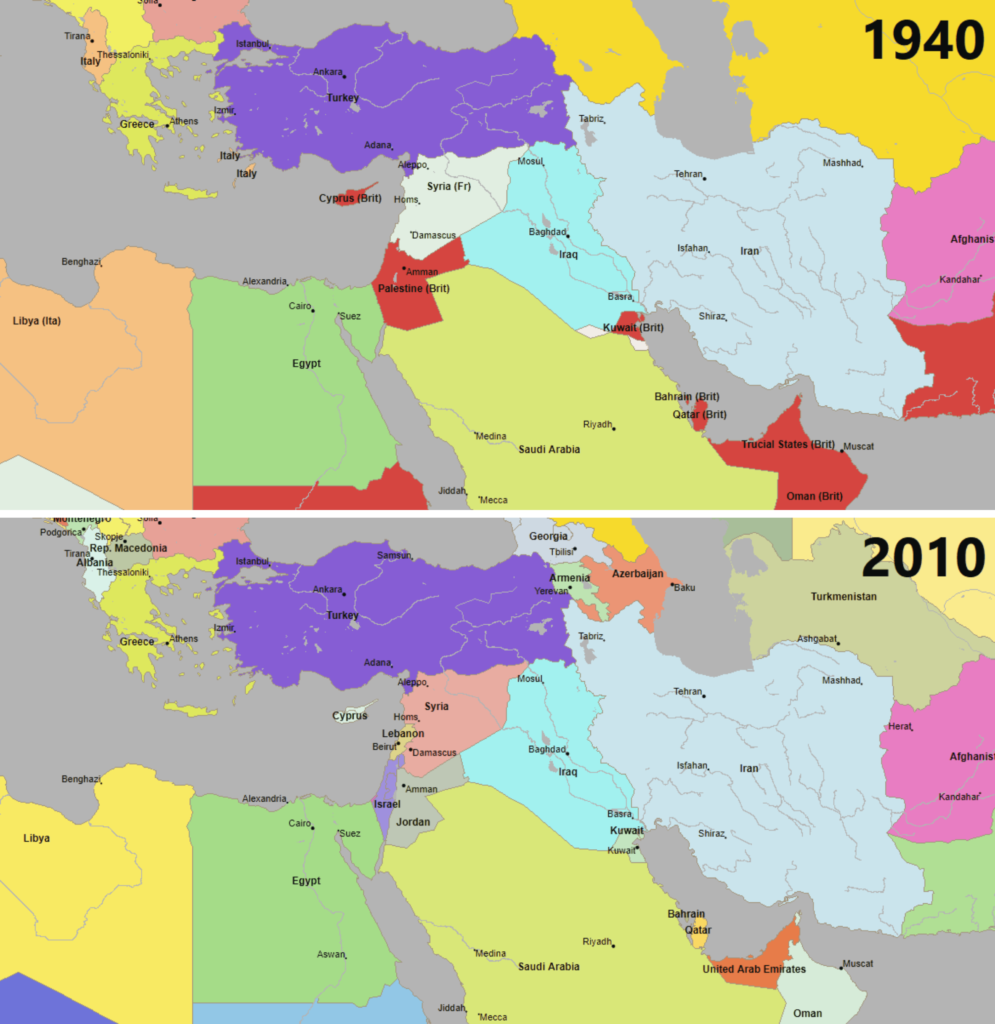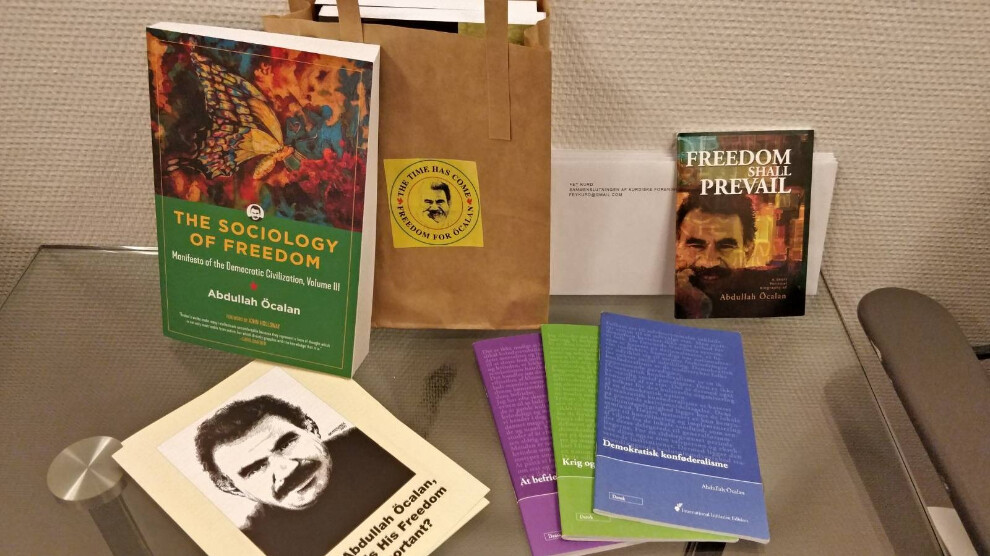On 7 October, the Palestinian militant group Hamas launched a major incursion from the Gaza Strip into nearby Israeli kibbutzim and military bases. More than 1,400 people were killed and nearly 200 taken hostage, including a significant number of civilians. Israel responded by declaring all-out war, with severe repercussions for Gaza.
Since then, Israeli air strikes have killed at least 8,796 Palestinians in Gaza, and the death toll continues to rise rapidly. It is also feared that this could escalate into a wider war involving Lebanon, Jordan, Egypt, Syria and Iran.
The ongoing Israeli bombardment of Gaza has brought back onto the global agenda long disregarded Palestinian demands for rights and an independent national state, which have been supported by the United Nations since 1947.
Leaders from many countries have called for an immediate ceasefire (which the United States, along with Israel, has so far rejected). They are also calling for urgent international negotiations to implement the UN two-state plan.
But the question still remains: can an end to decades of conflict be achieved through the two-state solution, often proposed as a means of resolving the Israeli-Palestinian conflict and bringing peace to the region?
Or, in the war-torn Middle East, wracked with Islamic extremism and sovereign violence, is a form of coexistence possible that reaches beyond the nation-state model?
The Two-State Solution: Examining Its Viability in the Israeli-Palestinian Conflict
Abdullah Öcalan, the jailed leader of the Kurdistan Workers’ Party (PKK), had expressed his views on the prolonged Israel-Palestine conflict comprehensively in his hand-written submissions to the European Court of Human Rights (ECHR) which was later published in five volumes under the title “Manifesto for a Democratic Civilization”.
As the Israeli-Palestinian conflict rages on, we look at Öcalan’s analysis of alternative solution.
Öcalan argues that the nation-state model fosters identity politics and undermines the diversity necessary for a functioning democracy and advocates a new form of inclusive citizenship beyond the conventional model of the nation-state. He stresses the importance of revitalising ideological principles and moving away from secessionist ideals in favour of a highly decentralised and radical form of democracy.

Öcalan’s model, termed ‘democratic confederalism’, has several key elements, the most important of which is the rejection of traditional nation-state structures. His concept of citizenship focuses on civic rather than ethnic affiliation, separating state institutions from national identity.
“The systematics of the nation-state in the Midle East is, contrary to it is claimed, not a source for solutions to the national or societal problems, but for furthering, aggravating and deepening them, and making them insoluble. The nation state does not solve problems, it creates them. Moreover, the same system is a means of exhausting not only the states themselves, but also the societies of the Middle East, pitting them against each other until they run out of strength”, writes Öcalan in his Manifesto of the Democratic Civilization, book 5: The Kurdish Question and the Democratic Nation Solution, volume II, pg 289.
Arguing that one of the main sources of the crisis in the Middle East is the restructuring processes of the Arab nation states and Israel, Öcalan further discusses the development of the nation-state with a particular focus on its ideological and historical roots, emphasising the paradigm of capitalist modernity on the global political system.
“The nation-state means that not only the cadres of the state but all citizens have a common ideological framework, as in a religion, with citizenship making every member of society also a member of the state.”¹
Öcalan therefore suggests that any form of nationalism in which all share a common goal “regardless of the division between the rulers and the ruled”, including Arab, Palestinian, Turkish, Kurdish and Iranian Shia, can be seen as the implementation of the same ideology by nationalist monopolies. The nation-state is a key instrument of universal government, which throughout history has often led societies into conflict and confrontation with other societies, he stresses.
“The Arab problem is not just a problem with Israel, nor can it be reduced to a Palestinian-Israeli problem. The deepest and most basic problem of Arab societies is primarily due to the division of the Arabs into twenty-two nation-states. These twenty-two states cannot play any role beyond collectively being an organ of agency of capitalist modernity. Their very existence is the most fundamental problem of the Arab peoples. In these circumstances, the Arab question is a problem related to the construction and establishment of capitalist modernity in the region. Only in this context, i.e. as the hegemonic power of capitalist modernity in the region, can they have a problem with Israel.
But let us not forget that the forces that built Israel and the twenty-two Arab nation-states are the same. Therefore, their relations and contradictions with Israel are a cover. In essence, since they share the same hegemonic system, these contradictions, however strong, can only be meaningful if they dare to step outside capitalist modernity.” ²
Öcalan points out that during the 19th century, Britain played a significant role in supporting the development of Arab nation-states and Israel by using various means, including backing Arab sheikhs, Orthodox clergymen in the Balkans, and sect leaders in Kurdistan. These efforts, combined with the dissolution of the Ottoman Empire, led to the creation of nation-states in the region.

The PKK leader further suggests that Israel’s formation was a natural outcome of the nation-state wars that had been unfolding in Europe for centuries. The official proclamation of Israel in 1948 marked a crucial event, establishing Israel as the core hegemonic power of capitalist modernity in the Middle East, he reiterates.
“The construction of Israel as a core hegemonic power is a very important issue. This means that other nation states in the region will be accepted as legitimate as long as they recognise the existence of Israel, the hegemonic power, and if they do not, they will be made to recognise it by attrition until they are brought into line through wars. Since the Republic of Turkey, Egypt, Jordan and some Gulf countries were among the first to recognise Israel, they were accepted as legitimate nation-states and included in the system. For the rest, the war continues with Israel and its allies and other countries. The wars and conflicts with the Arabs on the Palestinian question and with other Islamic countries on the Gulf question are closely linked to Israel’s hegemonic presence in the region. These conflicts, conspiracies, assassinations and wars will continue until Israel’s hegemony is recognised.”³

The Influence of Capitalist Modernity: Understanding Its Impact on the Region
Öcalan argues that in order to understand the Arab question and the challenges in the region, it is crucial to understand the impact of Israel on the Arab world, as well as the capitalist modernity and hegemony in the Middle East.
“The problems of the Arabs, like the problems of Turkey and the Turks, are not insoluble. There are two main axes on which the problems can be resolved and solved: The first axis is based on increasing one’s state and social shares within the same system and achieving results by creating guided conflicts for this purpose. This is what the Arab nation-states, including the Palestine Liberation Organisation, have been trying to achieve through the method of conflict for the past fifty years.
“The second main axis for the solution of the problems of the Arab world can only be based on the overcoming of capitalist modernity. This is where there has to be a break with the system. There must be a recognition that Islamic radicalism or political Islam cannot be an alternative to modernity.
“Islam as a culture can only play a role in the life of an alternative modernity to capitalist modernity. The most powerful and correct option for the Arab peoples is the paradigm of modernity appropriate to the historical and social realities of all the peoples of the Middle East. The alternative modernity for the peoples is the democratic modernity, which consists of the unity of the democratic national, socialist, ecological, feminist and cultural movements that have always struggled against capitalist modernity.
“In the context of the Arab world, the subaltern issues are related to the existence of Israel. The Arab nationalist, Islamist and nationalist view of Israel is itself guided by the hegemony of Israeli-Jewish ideology; it remains within the borders drawn by the Israeli-Jewish ideology and state. As long as it remains within the same modernity, it cannot be anything but a toy of the Israeli hegemony with a small population. Israel itself cannot escape being captive to the capitalist modernity it invented.
“Israel will never fail to defend itself with its technological superiority, including nuclear weapons, as long as it feels the presence of forces in the middle of the Arabian Sea around it, ready to drown it at any moment.
“Israel will either create an equilibrium of nation states under its own hegemony that have made their peace with it, which has proved very difficult for reasons cited earlier, or, if it wishes to rid itself of the captivity that it created, to risk capitalist modernity being overcome.
“Democratic modernity is the option that offers a lasting solution not only to the Jewish issue in the Middle East jungle, but also to the issue of the State of Israel, surrounded by nationalist and religious monstrosities of its own creation.” ⁴
* Check out Part 2: “Islamic movements in Palestine and the Middle East“ and Part 3: “Overcoming the Palestinian-Israeli deadlock”
¹ The Sociology of Freedom: Manifesto of the Democratic Civilization, book 3, pg 229
² Manifesto of the Democratic Civilization, book 5: The Kurdish Question and the Democratic Nation Solution, volume II, pg: 288
³ Manifesto of the Democratic Civilization, book 5: The Kurdish Question and the Democratic Nation Solution, volume II, pg: 287
⁴ Manifesto of the Democratic Civilization, book 5: The Kurdish Question and the Democratic Nation Solution, volume II, pg: 290










